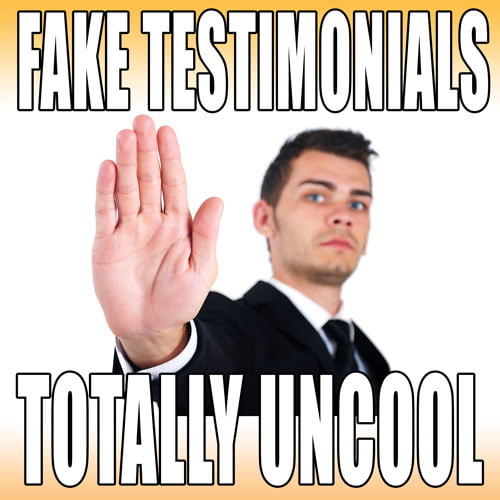Content Marketing Storytelling is a powerful means to get audience engagement. The problem with stories is that some of them aren’t true. Some are fiction; completely made up. They’re lies. Taking a non-fiction approach isn’t important for some marketers. They don’t care. They tell lies.
I see people doing this all the time. It looks so fun and easy; and as a marketer who wants results, I want to do it too. I want to create fake testimonials and tell stories about things that never happened. But I can’t. I’m going to tell you why I can’t make up lies in marketing and advertising. I’m going to tell you why you can’t use content marketing storytelling to make fiction appear real.
I’ve seen fake testimonials, and have been tempted to create them myself. I’d prefer to think of fictional stories as “usage examples for marketing.” My co-workers say this isn’t cool in marketing, especially when promoting a brand that needs to last. This frustrates me. I want to tell stories, but everyone says I can’t unless those stories happened already.
Technically, if the testimonial is representative of a “regularly expected experience” it’s OK. The line gets crossed when the experience described isn’t what most customers can expect regardless of whether it comes out of a real customer’s mouth or not. For example, a testimonial about a dentist can state “I enjoyed my visit” if the experience of most clients is “enjoyment”. You can’t say, for example, about a dentist, “He gave me two rows of extra teeth.” No. Nobody gets extra rows of teeth. It never works that way, so you can’t publish something with a testimony that says it does.
Why do I want to tell stories so badly? How can it hurt me?
Content Marketing Storytelling is one of online marketing’s most effective tactics. It is a logical progression from the more primitive, less effective means to engage audiences. By evolving away from brochureware, websites are more effective if they DON’T talk in the language of the company, but instead speak the language of the audience. Stories that an audience can relate to are super-effective. The problem is that there are liabilities to telling stories if you don’t keep yourself limited to the truth.
When you make up testimonials, the most basic kind of content marketing storytelling, to support a product or service, and don’t disclaim the story as being fictional, you can get in trouble. How can you get in trouble with fake testimonials?
Three ways to get in trouble with Content Marketing Storytelling:
- Getting your ads pulled by the publication or ad network
This is the most common circumstance. Even if you’re not doing anything wrong, you’ll still run into problems running ads.
At our marketing and advertising company, Massive Impressions Online Marketing, we have a client who is a cardiologist and runs a doctor supervised weight loss clinic. Even though his testimonials are 100% real, he has been in business for many years, has a stunning reputation and has tons of real clients who are thrilled to give testimonials, we still have trouble with his ads from time to time. Google pulls them. Facebook pulls them. Sometimes it’s because the reviewer doesn’t like the ad, sometimes they don’t like the page we’re linking to. It’s not that we are doing anything wrong, untruthful, against FTC regulations, violates publication ad policies, or simply misrepresents the truth. They just see “weight loss” and get twitchy. So don’t feel bad if your ads get pulled. It happens to the good guys too. - Getting fined by the FTC
It happens. The FTC has Guidelines on Endorsements and Testimonials in Advertising. Most of the guidelines spend a lot of time talking about weight loss claims. Much is said about how fake testimonials are unethical. One company got fined because it created fake app reviews on iTunes. Many companies have gotten in trouble for fake reviews on Yelp. The fake review cops seem to be growing in number ever day.But what about fake testimonials on a self-produced website, a domain that an advertiser controls directly? Sure, a solar manufacturer got fined close to $150,000 for putting fake testimonials and fake endorsements in YouTube videos and on their website. - Getting Sued by a Customer or by a Class Action Suit
Rip the wrong person off and they might just come after you. Get enough people angry and they’ll come after you to get their money back. The difference between the first two things that can happen to your ads or promotions and getting sued is the limit on the liability. With a class action suit, the liability can be higher than with fines. Plus you’re not being judged by an advertising expert at the FTC, but instead judgement is passed by judge or jury. That means that judgement comes from outside the industry, more difficult to predict the outcome of.
Even if I’m a real client of one of my clients I still feel a little weird about giving them a Google Review. I know that as long as I’m honest about my experience, there’s no foul committed, but in the long run that doesn’t really matter. Someone could still call you out for it. That’s why I stopped doing it recently as a matter of principle, as a marketer.
If you’re a marketer, how do you feel about giving your clients reviews, even completely honest ones?
Please let me know by leaving a comment below.














